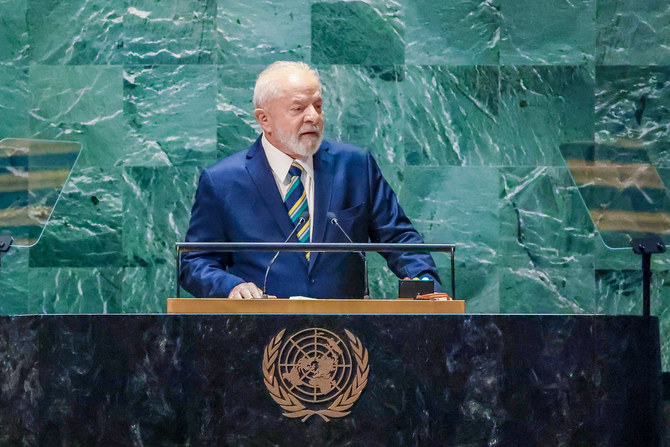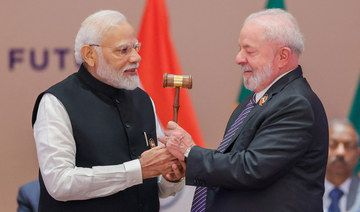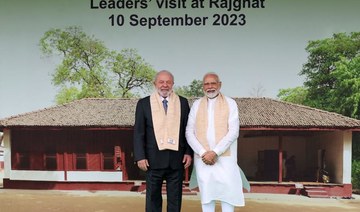SAO PAULO: During a powerful speech at the 78th UN General Assembly in New York on Tuesday, Brazil’s President Luiz Inacio Lula da Silva highlighted a number of global issues he described as critical,
These included climate change, the global wealth gap, gender equality, freedom of the press, the urgent need for sustainable development, and the importance of international cooperation and collective action to address these and other pressing global concerns.
He began by expressing solidarity with the victims of disasters that struck several countries this month, including the earthquake in Morocco, catastrophic flooding in Libya, and a cyclone in his own country that hit the southern state of Rio Grande do Sul.
He then.
Lula also took time to pay tribute to Sergio Vieira de Mello, a Brazilian diplomat and former UN high commissioner for human rights, who was killed in August 2003, along with 21 other people, many of them UN officials, in a terrorist bombing at the Canal Hotel in the Iraqi capital, Baghdad.
He underscored his enduring faith in humanity’s ultimate capacity to overcome the challenges it faces, such as the climate crisis, the persistence of hunger that affects 735 million people worldwide, and the growing global gap between rich and poor.
He lamented the fact that the fate of children is often determined by their social class and the region in which they are born and called for increased political will to combat the problem of inequality. He said that the world needs to overcome its collective feeling of resignation and the acceptance of injustice as a natural phenomenon.
The president reflected on Brazil’s return to democracy and its mission to rebuild a sovereign nation that is fair and supportive of all its people. He reiterated the nation’s commitment to the UN’s 2030 Agenda for Sustainable Development, and proposed an additional goal focusing on racial equality. He also spoke about initiatives designed to combat hunger, and promote gender equality and social participation.
Climate change took center stage in his speech, as Lula advocated for equitable climate action and emphasized Brazil’s commitment to clean energy, including green hydrogen. He said that 87 percent of Brazil’s electrical power now comes from clean and renewable sources.
“It is the vulnerable populations in the Global South who are most affected by the loss and damage caused by climate change,” he said.
“The richest 10 percent of the world’s population is responsible for almost half of all carbon released into the atmosphere. We, developing countries, do not want to repeat this model.”
He talked about efforts to combat deforestation in the Amazon and Brazil’s collaboration with other countries in the region on the issue through last month’s Belem Summit.
“Over the last eight months, deforestation in the Brazilian Amazon has already been reduced by 48percent,” Lula said. “The whole world has always talked about the Amazon. Now, the Amazon is speaking for itself.
“A month ago, we hosted the Belem Summit, at the heart of the Amazon, and launched a new collaboration agenda between countries that are part of that biome.
“There are 50 million South Americans in the Amazon, whose future depends on the decisive and coordinated action of the countries that hold sovereignty over the region's territories. We have also furthered dialogue with other countries that have tropical forests, in Africa and Asia.”
Looking ahead to the 2023 UN Climate Change Conference, which will begin in the UAE at the end of November, he said: “We want to arrive at COP28 in Dubai with a joint vision that reflects, without any coaching, the priorities for preserving the Amazon, Congo, and Borneo-Mekong basins based on our needs.”
Lula criticized the unequal distribution of financial and technological resources for climate action and highlighted the fact that an international promise made in 2009 to provide $100 billion a year to help developing countries finance climate action remains unfulfilled.
“Without mobilizing financial and technological resources, there is no way to implement what we decided in the Paris Agreement and the Global Biodiversity Framework,” he said.
“The promise to allocate $100 billion annually to developing countries remains just that, a promise. Today, this amount would be insufficient for a demand that already reaches trillions of dollars.”
Lula also highlighted the erosion of multilateralism, and the distorted representation of nations in international institutions, and market-driven inequalities, as he emphasized the need for a new model for economic governance.
He said this was one of the reasons for the emergence of BRICS, a grouping of emerging economies that currently includes Brazil, Russia, India, China and South Africa. The members recently revealed plans to expand the group, and have invited Saudi Arabia, the UAE, Iran, Ethiopia, Egypt and Argentina to join.
“The BRICS was the result of this paralysis and constitutes a strategic platform to promote cooperation between emerging countries,” Lula said.
“The recent expansion of the group at the Johannesburg Summit strengthens the fight for an order which accommodates the economic, geographic and political plurality of the 21st century.
“We are a force that works toward fairer global trade in the context of a serious crisis in multilateralism. Rich countries’ protectionism has gained strength and the World Trade Organization remains paralyzed, especially its dispute-settlement system. Nobody remembers the Doha Development Round anymore.”
The Doha Development Round was a WTO negotiation initiative that aimed to reduce trade barriers around the world, with a particular focus on the priorities of less-developed countries. Progress stalled in 2008, and the process now is effectively considered dead.
Brazil will take over the presidency of the G20 from India later this year.
“Upon taking over as the chair of the G20 in December, we will spare no effort to place the fight against inequalities, in all its dimensions, at the core of the international agenda,” Lula said.
“Under the motto ‘Building a Fair World and a Sustainable Planet,’ the Brazilian chair will coordinate social inclusion and the fight against hunger; sustainable development; and reform of global governance institutions.”
Turning to the importance of a global culture of peace, the Brazilian president voiced concerns about existing unresolved conflicts as well as emerging threats, including the Palestinian issue, the crisis in Haiti, and conflicts in several African nations. He stressed the need for dialogue as the foundation for lasting peace.
“Promoting a culture of peace is a duty for us all,” he said. “Building it requires persistence and vigilance. It is disturbing to see that old unresolved disputes persist, and new threats emerge or gain force.
“The difficulty of guaranteeing the creation of a state for the Palestinian people clearly shows this. Added to this case (we see) the persisting humanitarian crisis in Haiti, the conflict in Yemen, threats to Libyan national unity, and institutional ruptures in Burkina Faso, Gabon, Guinea-Conakry, Mali, Niger and Sudan.”
Lula called for a focus on development ahead of military spending, and criticized the unilateral application of sanctions, pledging that Brazil rejects such measures. He also expressed concern about the credibility of the UN Security Council and called for it to be reformed.
In closing, he urged the international community to show its outrage over inequality and to work together to create a more equitable, fair and fraternal world. He reiterated the urgent need to address global challenges, in particular inequality, through international cooperation and a renewed commitment to multilateralism.
























